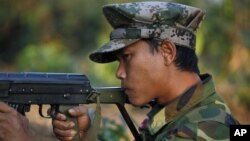The Burmese government has confirmed that it carried out air strikes this week against ethnic rebels in northern Kachin state, raising fresh concerns about the country's reform and fragile peace processes.
In an interview with VOA's Burmese Service on Wednesday, a government spokesperson acknowledged that "training jets" were used against Kachin rebels in response to attacks by the Kachin Independence Organization.
Some government officials had at first denied carrying out an air offensive in rebel-held territory. But officials later said the army used air strikes to help regain a base during an increase in fighting that began last week.
Each side has blamed the other for the escalation in violence, which broke out near rebel headquarters in Laiza, near the Chinese border.
Tens of thousands of people have been displaced since June 2011, when fighting broke out between the army and Kachin rebels, ending a 17-year ceasefire.
Ethnic groups in the northern part of the country have long accused the government of repressing them, and have been fighting for greater autonomy in their traditional states.
The Kachin is the only major ethnic rebel group not to reach a cease-fire agreement with the government of President Thein Sein, who has enacted a series of reforms since coming to power in 2011.
Observers say renewed fighting in Kachin state and ongoing sectarian violence in western Rakhine state have threatened to undermine the country's political reforms.
In an interview with VOA's Burmese Service on Wednesday, a government spokesperson acknowledged that "training jets" were used against Kachin rebels in response to attacks by the Kachin Independence Organization.
Some government officials had at first denied carrying out an air offensive in rebel-held territory. But officials later said the army used air strikes to help regain a base during an increase in fighting that began last week.
Each side has blamed the other for the escalation in violence, which broke out near rebel headquarters in Laiza, near the Chinese border.
Tens of thousands of people have been displaced since June 2011, when fighting broke out between the army and Kachin rebels, ending a 17-year ceasefire.
Ethnic groups in the northern part of the country have long accused the government of repressing them, and have been fighting for greater autonomy in their traditional states.
The Kachin is the only major ethnic rebel group not to reach a cease-fire agreement with the government of President Thein Sein, who has enacted a series of reforms since coming to power in 2011.
Observers say renewed fighting in Kachin state and ongoing sectarian violence in western Rakhine state have threatened to undermine the country's political reforms.






